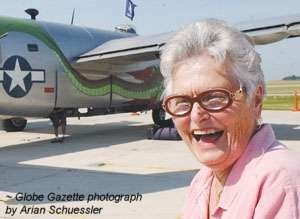


Cerro Gordo County Iowa
Part of the IaGenWeb Project
|
The Globe Gazette
she helped build

MASON CITY - Sixty years ago, Iona AHRENS of Thornton boarded a train in Mason City and headed out west to help in the war effort. "If I had been a boy, I would have been drafted," she said Monday. "I had to do something to help my country. In those days, that's how everybody felt." So AHRENS, who is now 78, and two girlfriends got on "The Rocket" in Mason City and rode to Kansas City, Mo., where they took the Santa Fe train to San Diego. The three girls worked at a defense plant where they helped make the B-24 Liberator airplane. "Just call me Rosie the Riveter," she said. On Monday, AHRENS watched with pride as a B-24 as well as a B-17 Flying Fortress landed at Mason City Municipal Airport. "This is just wonderful," she said, shading her eyes from the bright sunshine so she could get a better look at the type of aircraft she helped produce. "I put the bomb bay panel together and upholstered the nose of the plane," she said. "I worked for a company called Consolidated Vultee in San Diego. We were young but our parents didn't mind when we went out there. Everyone was so patriotic back then. "At home, I was only making $5 a week doing housework. In San Diego, I made $1.50 an hour plus time-and-a-half for overtime," she said. AHRENS, who said she believes in keeping busy, still operates a beauty shop in Thornton. She said the events of last Sept. 11 are a grim reminder of how complicated and dangerous the world can be today. "We live in a wonderful country. I hope it stays that way," she said. Jerry O'NEILL of Clear Lake is one of about a dozen North Iowans who have paid $350 to take a half-hour ride on one of the planes. "I've been kind of a student of the B-17 and my son flies for American Airlines so I have some real interest in aviation," he said. O'NEILL said he appreciated the work of the Collings Foundation, which is sponsoring the tour of the airplanes, and of Bill and Todd KYLE of North Iowa Air Service for coordinating the stop in Mason City. "I believe in what they're doing. They're trying to keep the spirit alive," he said. "This is history we're seeing here. If I live to be 90, I'll be in a nursing home somewhere kicking myself for all the opportunities I passed up in my life. This isn't going to be one of them," he said. Almost 300 spectators lined the fence outside and packed the airport restaurant, waiting for the planes to arrive. The B-24 was due in about an hour after the B-17 was to arrive. Two elderly gentlemen stood by the fence and discussed whether they should wait for the B-24. "Oh, let's go," said one of the men. "You've seen it before." "Yeah," said the other, "but that was 57 years ago!" The men stayed. The planes will be on display again today at the airport from 9 a.m. until 1 p.m. There is a fee of $7 for adults and $3 for children to tour through the aircraft. Rides are available for a $350 donation. Reservations can be made by calling the Collings Foundation at (978) 562-9182. For further information, interested persons should call North Iowa Air Service at (641) 424-9366.
She's part of the assembly line. She's making history, Working for victory Rosie the Riveter. With the U.S. male population marching off to serve during World War II, governmental campaigns targeted primarily housewives, urging them to hang up their aprons and take on what was male-dominated trades. Women worked in munitions plants, airplane factories, war supply factories, and other such jobs. It was their patriotic duty in the war effort. After the war with the return of the soldiers, many of the women returned to more female traditional work. Some women, however, continued their work in the factories. According to the Encyclopedia of American Economic History, the increase in the number of working American women rose to 20 million by 1944, a 57% increase from 1940. These women broke traditional gender opinions, proving that they could do a "man's job" and they did it well.
Additional source: en.wikipedia.org/wiki/Rosie_the_Riveter
|
Return to Cerro Gordo Military Index Page Return to Cerro Gordo Home Page